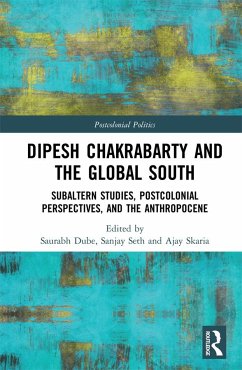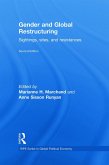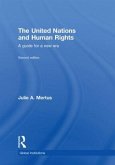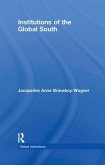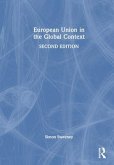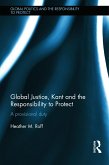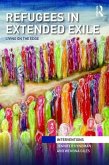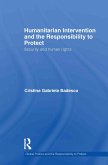Dipesh Chakrabarty and the Global South
Subaltern Studies, Postcolonial Perspectives, and the Anthropocene
Herausgeber: Dube, Saurabh; Skaria, Ajay; Seth, Sanjay
Dipesh Chakrabarty and the Global South
Subaltern Studies, Postcolonial Perspectives, and the Anthropocene
Herausgeber: Dube, Saurabh; Skaria, Ajay; Seth, Sanjay
- Gebundenes Buch
- Merkliste
- Auf die Merkliste
- Bewerten Bewerten
- Teilen
- Produkt teilen
- Produkterinnerung
- Produkterinnerung
This book comprises substantive yet short, academic yet accessible essays that are crafted in conversation with the critical questions raised by Chakrabarty's writings. Rather than exegeses and commentaries, these original, commissioned, pieces imaginatively engage Chakrabarty's insights and arguments.
Andere Kunden interessierten sich auch für
![Gender and Global Restructuring Gender and Global Restructuring]() Gender and Global Restructuring213,99 €
Gender and Global Restructuring213,99 €![The United Nations and Human Rights The United Nations and Human Rights]() Julie A MertusThe United Nations and Human Rights202,99 €
Julie A MertusThe United Nations and Human Rights202,99 €![Institutions of the Global South Institutions of the Global South]() Jacqueline Anne Braveboy-WagnerInstitutions of the Global South183,99 €
Jacqueline Anne Braveboy-WagnerInstitutions of the Global South183,99 €![European Union in the Global Context European Union in the Global Context]() Simon SweeneyEuropean Union in the Global Context156,99 €
Simon SweeneyEuropean Union in the Global Context156,99 €![Global Justice, Kant and the Responsibility to Protect Global Justice, Kant and the Responsibility to Protect]() Heather RoffGlobal Justice, Kant and the Responsibility to Protect223,99 €
Heather RoffGlobal Justice, Kant and the Responsibility to Protect223,99 €![Refugees in Extended Exile Refugees in Extended Exile]() Jennifer HyndmanRefugees in Extended Exile202,99 €
Jennifer HyndmanRefugees in Extended Exile202,99 €![Humanitarian Intervention and the Responsibility to Protect Humanitarian Intervention and the Responsibility to Protect]() Cristina Gabriela BadescuHumanitarian Intervention and the Responsibility to Protect213,99 €
Cristina Gabriela BadescuHumanitarian Intervention and the Responsibility to Protect213,99 €-
-
-
This book comprises substantive yet short, academic yet accessible essays that are crafted in conversation with the critical questions raised by Chakrabarty's writings. Rather than exegeses and commentaries, these original, commissioned, pieces imaginatively engage Chakrabarty's insights and arguments.
Produktdetails
- Produktdetails
- Verlag: Taylor & Francis
- Seitenzahl: 254
- Erscheinungstermin: 19. Dezember 2019
- Englisch
- Abmessung: 239mm x 155mm x 20mm
- Gewicht: 540g
- ISBN-13: 9780367189990
- ISBN-10: 0367189992
- Artikelnr.: 58482497
- Verlag: Taylor & Francis
- Seitenzahl: 254
- Erscheinungstermin: 19. Dezember 2019
- Englisch
- Abmessung: 239mm x 155mm x 20mm
- Gewicht: 540g
- ISBN-13: 9780367189990
- ISBN-10: 0367189992
- Artikelnr.: 58482497
Saurabh Dube is Professor-Researcher, Distinguished Category, at the Centre for Asian and African Studies, El Colegio de México; and holds the highest rank in the National System of Researchers (SNI), México. His authored works include Untouchable Pasts (1998, 2001); Stitches on Time (2004); After Conversion (2010); and Subjects of Modernity (2017, 2019). Dube has also written a quintet (2001-2017) in historical anthropology in the Spanish language as well as authoring the critical anthology El archivo y el campo (2019), all published by El Colegio de México. Among his more than fifteen edited volumes are Postcolonial Passages (2004); Historical Anthropology (2007); Enchantments of Modernity (Routledge, 2009, 2019); Modern Makeovers (2011); Crime through Time (2013); and Unbecoming Modern (second edition: Routledge, 2019). Dube is Series Editor of "Routledge Focus on Modern Subjects." Saurabh Dube has been Fellow of the John Simon Guggenheim Memorial Foundation, New York; the Institute of Advanced Study, University of Warwick; the Indian Institute of Advanced Study, Shimla; the Stellenbosch Institute of Advanced Study, South Africa; and the Max Weber Kolleg, Germany. He has also held visiting professorships, several times, at Cornell University, the Johns Hopkins University, and Goa University (where he presently occupies the DD Kosambi Chair). Sanjay Seth is Professor of Politics at Goldsmiths, University of London, where he is also Director of the Centre for Postcolonial Studies. He has written extensively on postcolonial theory, social and political theory, and modern Indian history, including Subject Lessons: The Western Education of Colonial India (Duke University Press 2007, and Oxford University Press India 2008), Marxist Theory and Nationalist Politics: Colonial India (Sage, 1995) and essays in a variety of journals including The American Historical Review, Comparative Studies in Society and History, Social Text , Positions, Cultural Sociology, International Political Sociology and Journal of Asian Studies. A number of these have been translated into Spanish and Portuguese, and a collection of his essays in Portuguese translation has been published as História e Pós-colonialismo (History and Postcolonialism), Edições Tinta-da-china, Lisboa, 2019. He is a founding editor of the journal Postcolonial Studies, and is currently completing a book tentatively titled "Beyond Reason?: Postcolonial Theory and the Social Sciences". Ajay Skaria is Professor in the Department of History and Institute for Global Studies at the University of Minnesota. His research till the early 2000s focused primarily on environmental history, Adivasi history and historical theory; more recently, his research interests have been in twentieth century Indian intellectual history, modern caste politics, postcolonial studies, and political theory. In addition to articles in these fields, he is the author of Hybrid Histories: Forests, Frontiers and Wildness in Western India (1999) and Unconditional Equality: Gandhi's Religion of Resistance (2015). He is currently working on a book on Ambedkar. He was a member of the Subaltern Studies editorial collective from 1995 till its dissolution, and coedited Subaltern Studies Vol XII: Muslims, Dalits and the Fabrications of History (2006). He is currently working on two books-a short essay, What is Secularism, and a longer monograph tentatively titled Ambedkar's Religions: Between Secularism and Navayana Buddhism.
1. Engaging Dipesh Chakrabarty: An Introduction Part 1: Affect and
Intellect 2. Between Critique and Creativity 3. Rethinking Indian
Constitutional History 4. The Significance of Provincializing Europe 5.
Labor History and "Culture" Critique Part 2: Critical Conversations 6.
Writing the Void 7. Histories, Dwelling, Habitations 8. A Correspondence on
Provincializing Europe Part 3: Global Pasts and Postcolonial Differences
9. Rights and Coercion 10. When Victims Become Rulers 11. The Cold War as a
Rule of Experts 12. Historical Wounds and the Public Life of History Part
4: Memory, Historiography and Trauma 13. Memory, Historiography and Trauma
14. Thinking Freedom with Gandhi 15. Western Thought as "Indispensable and
Inadequate" 16. Translating the Other Part 5: The Anthropocene and Other
Affiliations 17. History, Anthropogenic Soil and Unbecoming Human 18. Art
in the Time of Tricksters and Monsters 19. Indigenous Histories and
Indigenous Futures 20. Figures of Immanence
Intellect 2. Between Critique and Creativity 3. Rethinking Indian
Constitutional History 4. The Significance of Provincializing Europe 5.
Labor History and "Culture" Critique Part 2: Critical Conversations 6.
Writing the Void 7. Histories, Dwelling, Habitations 8. A Correspondence on
Provincializing Europe Part 3: Global Pasts and Postcolonial Differences
9. Rights and Coercion 10. When Victims Become Rulers 11. The Cold War as a
Rule of Experts 12. Historical Wounds and the Public Life of History Part
4: Memory, Historiography and Trauma 13. Memory, Historiography and Trauma
14. Thinking Freedom with Gandhi 15. Western Thought as "Indispensable and
Inadequate" 16. Translating the Other Part 5: The Anthropocene and Other
Affiliations 17. History, Anthropogenic Soil and Unbecoming Human 18. Art
in the Time of Tricksters and Monsters 19. Indigenous Histories and
Indigenous Futures 20. Figures of Immanence
1. Engaging Dipesh Chakrabarty: An Introduction Part 1: Affect and
Intellect 2. Between Critique and Creativity 3. Rethinking Indian
Constitutional History 4. The Significance of Provincializing Europe 5.
Labor History and "Culture" Critique Part 2: Critical Conversations 6.
Writing the Void 7. Histories, Dwelling, Habitations 8. A Correspondence on
Provincializing Europe Part 3: Global Pasts and Postcolonial Differences
9. Rights and Coercion 10. When Victims Become Rulers 11. The Cold War as a
Rule of Experts 12. Historical Wounds and the Public Life of History Part
4: Memory, Historiography and Trauma 13. Memory, Historiography and Trauma
14. Thinking Freedom with Gandhi 15. Western Thought as "Indispensable and
Inadequate" 16. Translating the Other Part 5: The Anthropocene and Other
Affiliations 17. History, Anthropogenic Soil and Unbecoming Human 18. Art
in the Time of Tricksters and Monsters 19. Indigenous Histories and
Indigenous Futures 20. Figures of Immanence
Intellect 2. Between Critique and Creativity 3. Rethinking Indian
Constitutional History 4. The Significance of Provincializing Europe 5.
Labor History and "Culture" Critique Part 2: Critical Conversations 6.
Writing the Void 7. Histories, Dwelling, Habitations 8. A Correspondence on
Provincializing Europe Part 3: Global Pasts and Postcolonial Differences
9. Rights and Coercion 10. When Victims Become Rulers 11. The Cold War as a
Rule of Experts 12. Historical Wounds and the Public Life of History Part
4: Memory, Historiography and Trauma 13. Memory, Historiography and Trauma
14. Thinking Freedom with Gandhi 15. Western Thought as "Indispensable and
Inadequate" 16. Translating the Other Part 5: The Anthropocene and Other
Affiliations 17. History, Anthropogenic Soil and Unbecoming Human 18. Art
in the Time of Tricksters and Monsters 19. Indigenous Histories and
Indigenous Futures 20. Figures of Immanence

